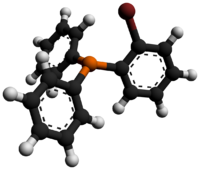(2-ブロモフェニル)ジフェニルホスフィン
化合物
(2-ブロモフェニル)ジフェニルホスフィン(英語: (2-bromophenyl)diphenylphosphine)は、化学式が (C
6H
4Br)P(C
6H
5)
2 で表される有機リン化合物である。白色の結晶性固体で、非極性溶媒に溶ける。トリフェニルホスフィン[1]の2-リチオ化誘導体の前駆体として使用され、他のホスフィン配位子の前駆体となる。
| (2-ブロモフェニル)ジフェニルホスフィン | |
|---|---|

| |

| |
(2-Bromophenyl)di(phenyl)phosphane | |
別称 (o-Bromophenyl)diphenylphosphine | |
| 識別情報 | |
| CAS登録番号 | 62336-24-7 |
| PubChem | 112836 |
| ChemSpider | 101130 |
| UNII | S8AQ9M4YUR |
| EC番号 | 263-515-1 |
| |
| |
| 特性 | |
| 化学式 | C18H14BrP |
| モル質量 | 341.18 g mol−1 |
| 外観 | 白色の固体 |
| 融点 |
115 ℃ |
| 特記なき場合、データは常温 (25 °C)・常圧 (100 kPa) におけるものである。 | |
合成
編集いくつかの方法で合成できる[1]。効率的な合成経路は、パラジウム錯体を触媒とするジフェニルホスフィンと2-ブロモヨードベンゼンのカップリング反応である[2]。 (Ph=C
6H
5)
- C
6H
4Br(I) + HPPh
2 + Et
3N → Ph
2P(C
6H
4Br) + [Et
3NH]I
この化合物は、(2-トリル)ジフェニルホスフィンと同形である[3]。
ブチルリチウムでリチオ化すると、o-リチオ化トリフェニルホスフィンが得られる。また、臭化物はグリニャール試薬を形成する。これらの金属化ホスフィンは多用途な試薬である[4]。
- BrC
6H
4PPh
2 + Mg → BrMgC
6H
4PPh
2 - 2 BrMgC
6H
4PPh
2 + PhPCl
2 → PhP[C
6H
4PPh
2] + 2 MgClBr
出典
編集- ^ a b Bennett, Martin A.; Bhargava, Suresh K.; Hockless, David C. R.; Welling, Lee L.; Willis, Anthony C. (1996). “Dinuclear Cycloaurated Complexes Containing Bridging (2-Diphenylphosphino)phenylphosphine and (2-Diethylphosphino)phenylphosphine, C6H4PR2 (R = Ph, Et). Carbon−Carbon Bond Formation by Reductive Elimination at a Gold(II)−Gold(II) Center”. Journal of the American Chemical Society 118 (43): 10469. doi:10.1021/ja961511h.
- ^ Zhang, Fushi; Wang, Liduo; Chang, Shih-Han; Huang, Kuan-Lin; Chi, Yun; Hung, Wen-Yi; Chen, Chih-Ming; Lee, Gene-Hsiang et al. (2013). “Phosphorescent Ir(iii) complexes with both cyclometalate chromophores and phosphine-silanolate ancillary: Concurrent conversion of organosilane to silanolate”. Dalton Transactions 42 (19): 7111–9. doi:10.1039/c3dt32408g. PMID 23518610.
- ^ Williams, Michael L.; Noack, Cassandra L.; Saverin, Rodney J.; Healy, Peter C. (2002). “(2-Bromophenyl)diphenylphosphine”. Acta Crystallographica Section E 58 (3): o306–o307. doi:10.1107/S1600536802002945. hdl:10072/6976.
- ^ Hartley, J. G., Venanzi, L. M., Goodall, D. C., "The preparation and complex-forming properties of one tritertiary and one tetratertiary phosphine", J. Chem. Soc. 1963, 3930. doi:10.1039/JR9630003930